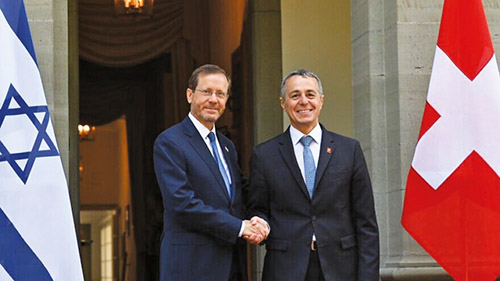
The Israeli president called on the international community to make it ‘crystal clear’ that calls to eradicate a sovereign member state of the United Nations were unacceptable.
Israeli President Isaac Herzog joined nearly 1,300 Jewish leaders, business people and donors from 38 countries this week at a three-day World Zionist Organization event celebrating the 125th anniversary of the First Zionist Congress.
Herzog met with Swiss President Ignazio Cassis at the Lohn Estate, the official estate of the Swiss Federal Council, where an agreement between the Israeli and Swiss national science foundations was signed in the presence of the two men.
At a joint press conference with Cassis, Herzog said: “As you and I discussed, Mr. President, the Middle East is at a critical crossroads. While the Abraham Accords have created new avenues for transforming the region into a hub of stability, peace and prosperity, at the same time, Iran and its proxies continue to spread terror and undermine moderate actors.
“I take this opportunity to call upon all governments, and, of course, the Swiss government, to oppose the Iranian nuclear program in no uncertain terms. Iran has sworn itself to Israel’s destruction and is working tirelessly to destabilize our region and the entire world.”
The Israeli president called on the international community to make it “crystal clear” that calls to eradicate a sovereign member state of the United Nations were unacceptable.
“Iran’s behavior cannot be met with silence. Iran’s activities cannot go unpunished. And, most critically, such a state must not be allowed to possess nuclear capabilities. Iran must be denied such capabilities, by all means necessary,” he said.
Herzog’s message came as the head of the IAEA had again asked Iran to explain why traces of enriched uranium were found at nuclear research sites that Iran had not told the world about three years ago.
“Give us the necessary answers, people and places so we can clarify the many things needed for clarification,” said IAEA Director-General Rafael Grossi, reported CNN.
Inspectors also discovered information regarding equipment in locations that had not been declared as sites of nuclear activities.
Iranian President Ebrahim Raisi has said that any plan to revive a nuclear deal with world powers must include a halt to international inspectors’ investigation into man-made uranium particles discovered at undeclared facilities in the country.
A report by the United Nations’ nuclear watchdog, revealed by Reuters this week, warned that Iran is pressing ahead with an upgrade to its advanced uranium enrichment program. This development comes as the West waits for Iran’s response to a “final” proposal to revive the 2015 nuclear deal.
According to the IAEA document, the first of three cascades of IR-6 centrifuges recently installed at the subterranean Fuel Enrichment Plant (FEP) in Natanz is actively enriching uranium, Reuters reported.
The IR-6 is the Islamic Republic’s most advanced model. Under the 2015 nuclear accord, Tehran would only be allowed to use less efficient first-generation IR-1 centrifuges.
Iran has been using IR-6 centrifuges to enrich uranium to up to 60% purity, close to that required for use in nuclear bombs, at an above-ground complex in Natanz for over 12 months, the report noted.
A second IR-6 cascade in Fordow, a site buried under a mountain, began enriching uranium in July.
In the confidential report to U.N. member states, the IAEA stated: “On August 28, 2022, the Agency verified at FEP that Iran was feeding UF6 [uranium hexafluoride] enriched up to 2% U-235 into the IR-6 cascade … for the production of UF6 enriched up to 5% U-235.”
Iran and the United States are moving closer to reviving the 2015 nuclear agreement, which removed sanctions against Tehran in exchange for promised restrictions on its nuclear activity.
CNN asked Grossi if the IAEA would close the probe without adequate answers, and Grossi replied: “Absolutely not. We want to be able to clarify these things. So far Iran has not given us the technically credible explanations we need to explain the origin of many traces of uranium, the presence of equipment at places.”
He responded that “this idea that politically, we are going to stop doing our job is unacceptable for us.”
“The IAEA’s independence is critical,” Herzog stated. “It should be strictly adhered to, including its ability to investigate violations of nuclear developments in Iran.”
“The Iranian president’s statement today is perfectly clear: It says, ‘We don’t respect the independence of the International Atomic Energy Agency to investigate open cases,’ which are major cases involving enriched uranium, located by IAEA inspectors,” Herzog added.
“I call on the international community, including from here in Switzerland, a loyal member of the international order, international law and the international community, to do everything to ensure the IAEA’s independence and of course to deny Iran nuclear weapons,” concluded Herzog.
By JNS Staff











